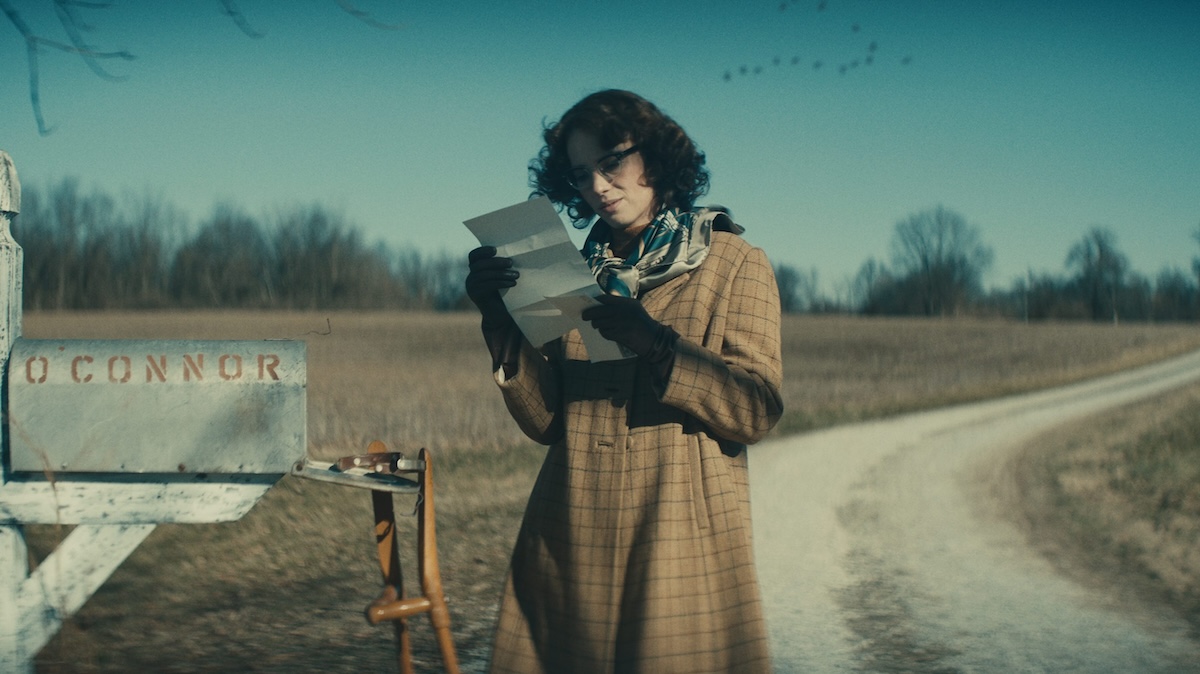A piece of art, completed, represents a long series of choices, from the first choice that artist made to pay attention to the tugging on the edge of his mind to the final daub of paint, deleted comma, or scrape on stone. When we sit down and look closely at an excellent piece of art, every choice should make sense and should be, upon examination, deliberate. Nothing should seem sloppy, haphazard. In a poem, every sound should be chosen; in a painting, every stroke. In a film, every frame should be the result of a careful, even if subconscious, choice.
But in the best pieces of art, all those choices don’t feel like choices. They feel absolutely natural. That really is the trick of art: to convince the audience that made thing, this series of human decisions, is in itself completely whole. Good art makes us believe this is real, this is inevitable.
Ethan Hawke’s decision to make a movie—in 2023, no less!—about the Southern gothic author Flannery O’Connor’s life and art is, from the beginning, a strange choice. But, grounded in that first curious choice, Hawke’s film Wildcat follows its material fearlessly, making a series of unexpected narrative, screenwriting, and casting choices that become inseparably a whole as odd and irreproachable as O’Connor’s own stories.
O’Connor’s oeuvre is notoriously disturbing; for every fierce defender, she has another detractor, a reader put off by her gloomy, twisted narratives. O’Connor herself was scarcely less strange than her stories—something she recognized in herself. A quote attributed to her (I could not verify it) goes, “You shall know the truth and the truth shall make you odd.” O’Connor, both as a human being and as an artist, continually made the choice to look her world full in the face, to not ignore any single element of it, no matter how jarring, irrational, malicious, or downright grotesque it was. She sought the truth, and it did, in fact, make her odd.
Hawke’s film follows O’Connor (a spectacular Maya Hawke) over just a few years, from her surprising early success as a short story author to a lupus diagnosis at the age of 25. The debilitating disease condemned her to live out the rest of her brief life in her mother Regina’s (Laura Linney) home in Milledgeville, Georgia. O’Connor died in 1964 at the age of 37.
In keeping with its odd heroine, Wildcat is magnificently odd. One of the boldest choices in the film is the decision to tell O’Connor’s life right alongside some of her best short stories. Maya Hawke and Linney play the twisted, sanctimonious, ecstatic, vile characters from “Revelation,” “Parker’s Back,” and “Good Country People,” among others, their stories spliced into O’Connor’s own quest for grace and redemption. These narrative switches could easily have resulted in a muddy film, but in Wildcat they are clean and comprehensible. The film uses different color palates, music, and settings to set off each narrative, so that I never lost track of which story we were in, even as the lines between O’Connor and her characters blurred and sometimes vanished.
The emotions and drama transfer beautifully from one setting to another. O’Connor’s anguished disappointment at the collapse of her hopes carries over to the excoriating rage Sarah Ruth vents on Obadiah in “Parker’s Back.” The strange grace that touches the odious Mrs. Turpin in “Revelation” reaches out of the short story to touch O’Connor herself as she lies in bed and bares her tormented spirit to her confessor.
Stories within stories
Told this way, it becomes clear that these stories, grim and often horrifying, are themselves confessions from the bottom of O’Connor’s soul. Maya Hawke plays, in turn, a fundamentalist who refuses to recognize Christ’s face when it is before her; a young man who begrudges his mother even a scrap of love and respect; a one-legged atheist seducing a Bible salesman who is not what he seems; a mentally retarded (what would today be termed “intellectually disabled”) girl married off to a tramp; and a mentally ill prophetess in a doctor’s waiting room. Each of these characters becomes a window into O’Connor’s own character, particularly her relationship with her mother, played in even her most unbearable moments with gentle humor by Linney.
Linney appears over and over in the short story elements of the film as the overbearing Southern mother figure: passive-aggressively religious, blandly racist, quietly self-righteous in contrast to the tortured characters played by Hawke. But this is where Wildcat shines most clearly. Just as in O’Connor’s own stories, the film refuses to reduce Linney’s characters to stereotypes, and it refuses to withhold grace even from the most appalling people.
The inclusion of the short story “Revelation,” the last one O’Connor wrote, allows Wildcat to address head-on one of the most difficult elements of O’Connor’s own life, one that any biographical project must grapple with: her identity as a Southern writer living and working in a deeply racist time and place. O’Connor’s work, committed as it is to looking reality squarely in the face, does not shy away from documenting the racism—both casual and aggressive—of the society she lived in. This makes her stories acutely painful for readers today, sensitive as we are to this issue. It also makes her stories difficult to tell. Our discourse on the topic of race often lacks any room for grace, especially the kind of grace O’Connor was seeking through her work. That grace, while the same kind as the divine light that blinded St. Paul on the road to Damascus, appears in O’Connor’s work as quick gleams, flashing out and vanishing sometimes in the same moment. In “Revelation,” a shocking burst of violence brings a self-satisfied Southern landowner face-to-face with her own classism and racism. There is profound grace in the revelation; we sense that we are in fact witnessing a soul being changed. Yet even this encounter with divine grace leaves us unsatisfied. Why?
“Revelation,” both the short story and the brief telling of it in Wildcat, is O’Connor’s most skillful wielding of the scalpel. We witness a miracle: God speaks to a woman. The story doesn’t equivocate. That is what actually happens. A common, everyday woman receives a revelation. But we don’t like it. Here is where O’Connor’s genius becomes evident. We don’t like it because God speaks to this woman—a woman we are trained by society and by the story to despise—in her own language.
The revelation comes in the form of Jesus, a quintessentially white Jesus, offering Mrs. Turpin a choice between reincarnation as what she calls “white trash” and reincarnation as a middle-class Black woman. The question forces Mrs. Turpin to confront her own spiritual state and to realize that she is devoid of true love. In Wildcat, this moment is depicted with every stereotype of “religious ecstasy,” from a filmy white mist floating in to surround a glowing-faced Linney to a standalone door opening to reveal ethereal light. It is kitschy, irritating, laughable. And yet, O’Connor argues, it is true grace.
That is O’Connor’s genius, and incredibly that genius is allowed to permeate Wildcat. The film is odd, certainly. It is vexing. It could be accused of being plotless, meandering. It is not “politically correct.” But that is the nature of grace. Grace is rarely straightforward and easy to trace through a life. Rather, it starts and stops, flashes out then vanishes, shifts language and color and tone as needed.
Dark and splendid graces
One of the best scenes in Wildcat shows a priest (Liam Neeson) visiting the afflicted O’Connor. Here, finally, she pours out the anguish in her soul, and we see clearly the relationship between her writing and her own salvation. O’Connor’s journal and letters show that she was acutely aware of her own sin, and of her own awareness of her sin, to a degree that Catholics who struggle with scrupulosity will recognize. She knew herself and her own capacity for pettiness, vileness, and evil, and that knowledge gave her the clarity to write the stories she did. In talking to the priest, she bemoans the fact that she struggles to show charity in many of the more conventional ways. All she can do, she cries, is write. The priest responds, “Then write!”
Wildcat is indeed a careful, loving biopic of a difficult literary figure. But it is much more than that. It is a glimpse of the hard reality of grace in a life, grace that is often unrecognized and unwelcome but still there, still working. The brief moments of truly divine beauty in the film come at the most unexpected moments, as when the camera lingers on a bird flapping its wings against the white circle at the top of an empty silo—the dove descending, clear as day. That is real. But the work of grace often takes place in far messier, darker, often bloodier ways, shown through fierce and difficult choices that, seen from afar, reveal an image of redemption.

